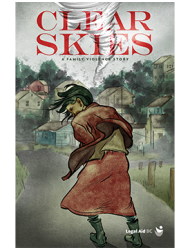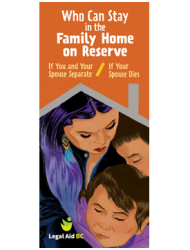Marnie and her kids live with family violence. But with the support of her community, and by learning about her legal options, Marnie is able to leave an abusive relationship. Clear Skies is Marnie's story. Find out more information about this video.
How to get help
Abuse and family violence
If you or someone you know is experiencing abuse, help is available. See our page Abuse and family violence for more information.
Sometimes leaving your partner can trigger more violence. It's very important to stay safe. If you're in immediate danger, call 911.
To find the nearest victim service worker, safe house, or transition house, call VictimLinkBC:
1-800-563-0808 (24 hours a day)
VictimLinkBC provides services in over 100 languages, including 17 North American Aboriginal languages.
It's also very important to get legal help. Call Legal Aid BC right away to find out if you qualify for a free lawyer:
604-408-2172 (Greater Vancouver)
1-866-577-2525 (elsewhere in BC)
Who can stay in the family home on reserve
For more information about who can stay in the family home on reserve if your relationship breaks down, see our page Your home on reserve.
See our page Legal Aid BC can help you for how to apply for legal aid or legal advice.
Legal Aid BC has a range of free resources that can help you. This includes resources about family law and criminal law, and resources for Aboriginal peoples.
For more information about family law, see the Justice Education Society's Family Law in BC website.
Glossary
Safety information for Marnie
Safe house
Temporary accommodation (place to stay) in a community that doesn't have transition houses. It might be a rental apartment, private home, or a hotel unit.
Transition house
Temporary housing that provides a safe and secure environment for women and their children leaving an abusive relationship.
Safety plan
A safety plan is made up of steps you can take to protect yourself and your children. It's a good idea for a friend, advocate, or victim service worker to help you make your safety plan.
James' criminal trial
Bail hearing
A hearing where a judge or justice of the peace decides whether to release someone on bail before their trial. They usually have to follow conditions while they're on bail.
Crown counsel
The lawyer who works with the Attorney General. It's their job to put forward the case against someone charged with a crime.
No contact order
A court order that says your partner or ex-partner can't contact you. The order might be a condition of release from custody before trial (bail). Or it might be a condition of probation.
It's a crime to break a no contact order. This includes all direct and indirect communication. Direct and indirect communication include texts, emails, voicemails, and messages passed through friends or family.
Peace bond
An order a judge makes to protect you from your partner or ex-partner. It lists the conditions that your partner must follow.
Victim service worker
Someone who works with the police and the courts to help victims of crime. They provide information, referrals, and emotional support.
Victim impact statement
Crown counsel might ask you to fill out one of these. It gives you a chance to explain what effect the assault or harassment has had on you and your children.
Marnie's family law case
Court order
A document that records the judge's decision. It's entered at the court registry after the judge makes their decision. Court orders include support, guardianship, protection, and parenting orders.
Exclusive occupation order
A court order if you live on reserve and you and your partner break up. It says one of you has to leave the home for a long time.
Judges make these orders under the Family Homes On Reserves and Matrimonial Interests or Rights Act. This act is new as of December 16, 2014. Find out more on our page Your home on reserve.
Family law protection order
An order a judge makes in a family court to protect you from your partner or ex-partner. It lists the conditions that your partner must follow.
Interim order
A temporary order a judge makes that applies to both parties. This is until you get a final order at a trial. The judge bases it on the limited evidence you and your partner or ex-partner presented when the order was requested.
VictimLinkBC — Counselling, information, and referrals
Native Courtworkers and Counselling Association — Culturally appropriate services and support
Indigenous community legal workers — Give free legal information and limited advice services
See more
Community support services
100 Mile House District Women's Centre Society — Call 250-395-4093
Ministry of Indigenous Relations and Reconciliation — See their Guide to Indigenous Organizations and Services in British Columbia — Organizations that can help
Vernon Women's Transition House Society — Call 250-542-1185
Counselling and support
Women Against Violence Against Women — Counselling program — Call 604-255-6344 — Vancouver
Crisis support and counselling
Battered Women's Support Services – Aboriginal Women's Program — Across BC
Elizabeth Fry Society — Burns Lake — Call 250-692-5720 (24 hours a day)
Elizabeth Fry Society — Prince George — Call 1-866-563-1113 (24 hours a day)
KUU-US Crisis Line Society — Crisis line dedicated to the Aboriginal community — Call 1-800-588-8717 (24 hours a day)
Women Against Violence Against Women — 24-hour Crisis Line — Call 1-877-392-7583 — Across BC
Health and wellness
BC Association of Friendship Centres — Find a friendship centre in your area
Housing services
Helping Spirit Lodge Society — Spirit Lodge Transition House — Call 604-872-6649
ShelterSafe — Emergency support and an interactive map of all shelters in Canada
Legal help
Access Pro Bono Law Clinics — Free legal help
BC211 — Helps people in Metro Vancouver and Fraser Valley districts to find available shelters — Call 211
Bella Coola Legal Advocacy Program — Free legal help — Bella Coola
Family duty counsel — Free legal advice — Kwadacha and Tsay Key Dene — Call 1-877-601-6066
Family duty counsel — Free legal advice on family matters — Williams Lake — Call 778-395-6200
First Nations and Métis Outreach Program (The Law Centre, University of Victoria) — Free legal help, including family matters — Victoria
Free legal advice clinics — Carrier Chilcotin Tribal Council and Williams Lake — Call 604-681-8021
Indigenous community legal workers — Give legal information and limited advice services
PovNet — Information about poverty issues and links to organizations that can help
UBC Indigenous Community Legal Clinic — Free legal help on various legal matters — Call 604-684-7334 (Greater Vancouver) or 1-888-684-7334 (elsewhere in BC)
Upper Skeena Counselling Legal Assistance Society — Free legal help — Hazelton
Victoria Native Friendship Centre — Free legal clinic, including family matters — Call 250-412-7794


